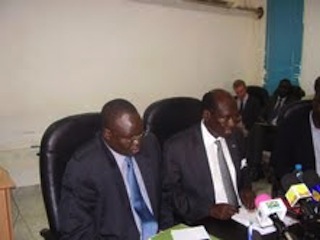South Sudan accuses Sudan of using militia to block alternative oil pipeline
February 13, 2013 (JUBA) – South Sudan accused the government of neighbouring Sudan on Tuesday of recruiting and using rebel militia to destabilise the young nation in order to block Juba’s plans to build a new alternative oil pipeline.

The government is looking to build an alternative pipeline to connect landlocked South Sudan to the East African coast through three possible routes: Ethiopia-Dijbouti; Uganda-Kenya or directly through Kenya to a proposed new port in Lamu.
The South Sudanese government has long accused Sudan of backing rebellions in its territory to destabilise the country after it seceded in 2011, but this is the first time Juba has linked the alleged support of rebels with its attempts to build a new oil pipeline.
“The government of Sudan is deliberately sponsoring all militia activities in this country, especially in Jonglei state,” South Sudan’s information minister, Barnaba Marial Benjamin, said.
The minister repeated the South’s allegation that the government of Sudan is supporting David Yau Yau and his rebellion based in Pibor county, which began 2010.
Yau Yau integrated his forces in South Sudan’s army (SPLA) in 2011, but rebelled for a second time in April 2012, in an act that shows Sudan has “has decided to fight us through proxy forces”, Marial said.
“The current security situation in Jonglei is not just about tribal conflict. There is a strategic economic reason why Khartoum wants to cause instability in this area. The intention is to block plans to build an alternative oil pipeline,” he added.
At the time of the oil shutdown in January 2012, South Sudan’s 350,000 barrels per day of oil production was processed in Sudan and exported through Port Sudan on the Red Sea.
The two sides eventually reached agreement in September last year but it has not been implemented as Sudan insists that border security issues be resolved first.
Under the deal, South Sudan was to pay between $9.10 and $11 a barrel to export its crude through the north, as well paying Khartoum $3.8 billion to help Sudan overcome the loss of three quarters of its oil production due to southern secession.
“Building our own pipeline is the top priority. We have identified a site already. The contractors have expressed readiness to start the work. This is what the government of Sudan does not want. It wants to sabotage it by all means”, Marial said, adding that the government has a responsibility to clear the area of militia activities before May.
South Sudan’s oil minister, Stephen Dhieu, told Sudan Tribune this month that work on the alternative pipeline is due to begin in October, but added that the route still needed to be decided.
“It is just a matter of time. It is not the business of Khartoum and Yau Yau to create instability.”
Yau Yau hails from the Murle ethnic group, who he has recruited from for his rebellion, with Murle youth regularly accused of carrying out cattle raids on other groups in Jonglei.
This week, Yau Yau’s rebels were accused of carrying out an attack that, according to local officials, killed over 100 people in Akobo county.
Marial said that the South Sudanese “government has a responsibility to protect its citizens including the Murle, because they are part of this nation. There are members of Murle in this government. They are in the parliament and in the executive. The criminal activities in Jonglei will be brought to an end before May”, he said.
South Sudan’s deputy defence minister, Majak D’Agot, told the same media briefing that the army will “flush away” Yau Yau from Jonglei and called on the international community to put pressure on Sudan “to stop [the] proxy war”.
Sudan accuses South Sudan of backing their former comrades – the Sudan People’s Liberation Movement-North (SPLM-N) – who have been fighting the Sudanese army in the Blue Nile and South Kordofan border states since 2011.
D’Agot accused Sudan of amassing troops along the tense and disputed new international border and launching attacks on Southern territory.
“The glaring and unacceptable act is the recent incursion by the Sudanese government. It carried out attacks in areas lying deeply inside [the] territory of the Republic of South Sudan. It attacked Balbala in Western Bahr el Ghazal, Warguet in Northern Bahr el Ghazal and raided farms in Renk in Upper Nile state. Lives and properties have been lost. Many people have been uprooted from their homes and displaced”, the deputy minister said.
South Sudan has honoured all the agreements it signed with Sudan, D’Agot said, yet Khartoum continues to pursue military options instead of respecting the terms of the deals.
“The last two months have seen unusual activities. The government of Sudan has been moving heavy weaponry and carried out attacks. It is still building up and moving troops. It continues to violate our airspace, bombing our areas and killing innocent civilians and damaging properties. These are all indications of possible plans to impose military solutions. We have alerted our neighbours. We have alerted the African Union, the United Nations and the regional groups and we put our forces on maximum alert and ready to deal with any situation”, he said at the news conference in Juba on Tuesday.
(ST)
